高二阅读理解精选精炼(10)
- 格式:doc
- 大小:38.00 KB
- 文档页数:5
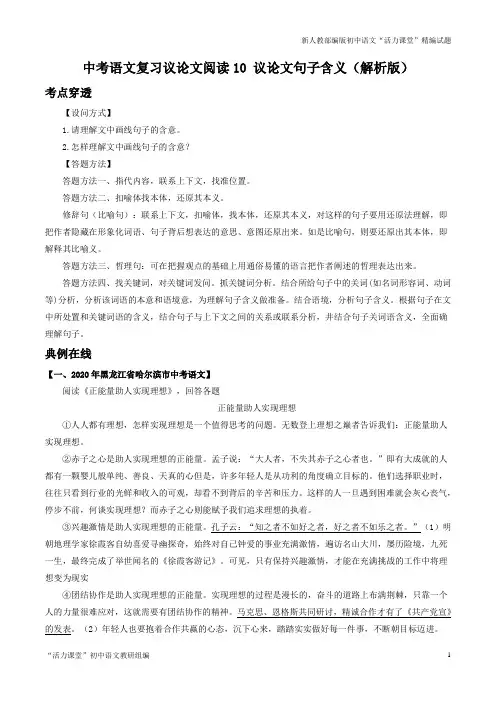
中考语文复习议论文阅读10 议论文句子含义(解析版)考点穿透【设问方式】1.请理解文中画线句子的含意。
2.怎样理解文中画线句子的含意?【答题方法】答题方法一、指代内容,联系上下文,找准位置。
答题方法二、扣喻体找本体,还原其本义。
修辞句(比喻句):联系上下文,扣喻体,找本体,还原其本义,对这样的句子要用还原法理解,即把作者隐藏在形象化词语、句子背后想表达的意思、意图还原出来。
如是比喻句,则要还原出其本体,即解释其比喻义。
答题方法三、哲理句:可在把握观点的基础上用通俗易懂的语言把作者阐述的哲理表达出来。
答题方法四、找关键词,对关键词发问。
抓关键词分析。
结合所给句子中的关词(如名词形容词、动词等)分析,分析该词语的本意和语境意,为理解句子含义做准备。
结合语境,分析句子含义。
根据句子在文中所处置和关键词语的含义,结合句子与上下文之间的关系或联系分析,井结合句子关词语含义,全面确理解句子。
典例在线【一、2020年黑龙江省哈尔滨市中考语文】阅读《正能量助人实现理想》,回答各题正能量助人实现理想①人人都有理想,怎样实现理想是一个值得思考的问题。
无数登上理想之巅者告诉我们:正能量助人实现理想。
②赤子之心是助人实现理想的正能量。
孟子说:“大人者,不失其赤子之心者也。
”即有大成就的人都有一颗婴儿般单纯、善良、天真的心但是,许多年轻人是从功利的角度确立目标的。
他们选择职业时,往往只看到行业的光鲜和收入的可观,却看不到背后的辛苦和压力。
这样的人一旦遇到困难就会灰心丧气,停步不前,何谈实现理想?而赤子之心则能赋予我们追求理想的执着。
③兴趣激情是助人实现理想的正能量。
孔子云:“知之者不如好之者,好之者不如乐之者。
”(1)明朝地理学家徐霞客自幼喜爱寻幽探奇,始终对自己钟爱的事业充满激情,遍访名山大川,屡历险境,九死一生,最终完成了举世闻名的《徐霞客游记》。
可见,只有保持兴趣激情,才能在充满挑战的工作中将理想变为现实④团结协作是助人实现理想的正能量。
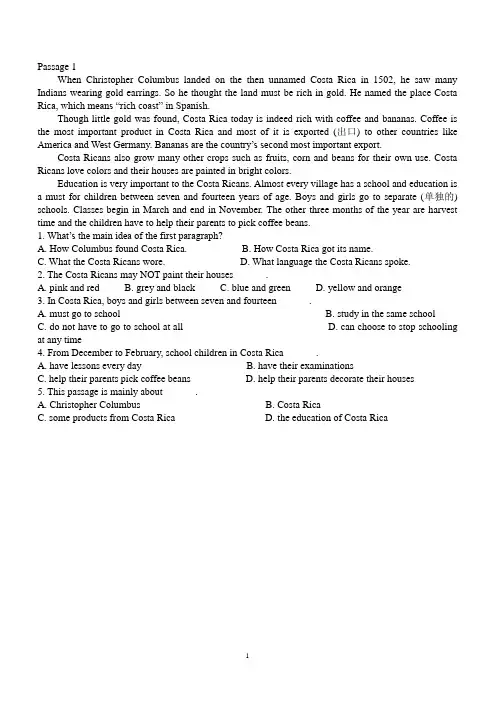
When Christopher Columbus landed on the then unnamed Costa Rica in 1502, he saw many Indians wearing gold earrings. So he thought the land must be rich in gold. He named the place Costa Rica, which means “rich coast” in Spanish.Though little gold was found, Costa Rica today is indeed rich with coffee and bananas. Coffee is the most important product in Costa Rica and most of it is exported (出口) to other countries like America and West Germany. Bananas are the country’s second most important export.Costa Ricans also grow many other crops such as fruits, corn and beans for their own use. Costa Ricans love colors and their houses are painted in bright colors.Education is very important to the Costa Ricans. Almost every village has a school and education is a must for children between seven and fourteen years of age. Boys and girls go to separate (单独的) schools. Classes begin in March and end in November. The other three months of the year are harvest time and the children have to help their parents to pick coffee beans.1. What’s the main idea of the first paragraph?A. How Columbus found Costa Rica.B. How Costa Rica got its name.C. What the Costa Ricans wore.D. What language the Costa Ricans spoke.2. The Costa Ricans may NOT paint their houses ______.A. pink and redB. grey and blackC. blue and greenD. yellow and orange3. In Costa Rica, boys and girls between seven and fourteen ______.A. must go to schoolB. study in the same schoolC. do not have to go to school at allD. can choose to stop schooling at any time4. From December to February, school children in Costa Rica ______.A. have lessons every dayB. have their examinationsC. help their parents pick coffee beansD. help their parents decorate their houses5. This passage is mainly about ______.A. Christopher ColumbusB. Costa RicaC. some products from Costa RicaD. the education of Costa RicaChristian Eijkman, a Dutch doctor, left the Netherlands for the island of Java. Many people on the island had a disease called beri-beri. He was going there to try and find a cure.At first, Eijkman thought some kind of germ (细菌) caused beri-beri. He raised some chickens. He didn’t eat them, but made experiments on them. The local people were quite surprised at that. One day he noticed that his chickens became sick when they were fed the food most Javanese ate —refined white rice (精炼米). When he fed them with unrefined rice, also known as brown rice, they recovered. Eijkman realized that he had made an important discovery — that some things in food could prevent disease. These things were named vitamins (维生素). The Javanese were not getting enough vitamins because they had actually removed the part that contains vitamins. Later, other diseases were also found to be caused by the lack of vitamins in a person’s food.Today many people know the importance of vitamins and they make sure they have enough vitamins from the food they eat. If they don’t, they can also take vitamin pills.6. The underlined word “cure” in Paragragh 1 probably means ______.A. a medical treatmentB. a kind of vitaminC. a kind of germD. a kind of ric7. Christian Eijkman went to the island of Java to ______.A. spend his holidayB. find ways to grow better cropsC. do some research about the islandD. help the Javanese with their illness8. Why did Christian Eijkman raise some chickens?A. To eat them.B. To carry out his experiments.C. To give the Javanese a surprise.D. To make money by selling them.9. If a person doesn’t get enough vitamins in his diet, he’d better ______.A. eat more riceB. eat more meatC. eat some chickenD. eat vitamin pills10. We can learn from the passage that ______.A. beri-beri was caused by chickensB. the Javanese didn’t like vita minsC. Christian Eijkman’s experiment was successfulD. the Javanese’s disease was caused by a kind of germAmerica is a mobile society. Friendships between Americans can be close and real, yet disappear soon if situations change. Neither side feels hurt by this. Both may exchange Christmas greetings for a year or two, perhaps a few letters for a while — then no more. If the same two people meet again by chance, even years later, they pick up the friendship. This can be quite difficult for us Chinese to understand, because friendships between us flower more slowly but then may become lifelong feelings, extending (延伸) sometimes deeply into both families.Americans are ready to receive us foreigners at their homes, share their holidays, and their home life. They will enjoy welcoming us and be pleased if we accept their hospitality (好客) easily. Another difficult point for us Chinese to understand Americans is that although they include us warmly in their personal everyday lives, they don’t show their politeness to us if it requires a great deal of time. This is usually the opposite of the practice in our country where we may be generous with our time. Sometimes, we, as hosts, will appear at airports even in the middle of the night to meet a friend. We may take days off to act as guides to our foreign friends. The Americans, however, express their welcome usually at homes, but truly can not manage the time to do a great deal with a visitor outside their daily routine. They will probably expect us to get ourselves from the airport to our own hotel by bus. And they expect that we will phone them from there. Once we arrive at their homes, the welcome will be full, warm and real. We will find ourselves treated hospitably.For the Americans, it is often considered more friendly to invite a friend to their homes than to go to restaurants, except for purely business matters. So accept their hospitality at home!11. The writer of this passage must be ______.A. an AmericanB. a ChineseC. a professorD. a student12. Which of the following statements is TRUE according to the passage?A. Friendships between Americans usually extend deeply into their families.B. Friendships between Americans usually last for all their lives.C. Americans always show their warmth even if they are very busy.D. Americans will continue their friendships again even after a long break.13. From the last two paragraphs we can learn that when we arrive in America to visit an American friend, we will probably be ______.A. warmly welcomed at the airportB. offered a ride to his homeC. treated hospitably at his homeD. treated to dinner in a restaurant14. The underlined words “generous with our time” in Paragraph 3 probably mean ______.A. strict with timeB. serious with timeC. careful with timeD. willing to spend time15. A suitable title for this passage would probably be “______”.A. Friendships between ChineseB. Friendships between AmericansC. Americans’ hospitalityD. Americans’ and Chinese’s views of friendshipsThe other day I heard a few local musicians talking:“I hate all the terrible pianos in this town. I hate that rubbish they play on the radio. They can’t even understand a bit of music.”“I’m never playing in that club again. Too many drunks and nobody listens to us.”But, one younger musician said, “There are a few clubs that book my band a few nights a month, and I’m trying to find other places to play. I’m also looking to book a few summer festivals this year.”I’ve heard that you are the average of the five people whom you spend the most time with, or to put it another way, you are who your friends are.Attitu des are important. Whether they’ positive or negative, they’ rubbing off on you. If you’ around re re re people who complain about lack of work and about other musicians, or blame (责怪) others, and you play the role of victim (受害者), chances are you will start to as well. So it’s time to take a look at the people you call “friends”.This is an easy exercise: Make a list of the people who you hang out with, and simply stop spending time with the negative people on your list. Set a new standard (标准) for yourself and don’t become friends with people who fall below that standard.Keep successful people around you and your own chances for success will be much better. Ask them how they do it. Ask if they will help you get the work you’re looking for, or maybe give you some advice to help you on your career path.16. Which of the following would be the best title for this passage?A. A friend in need is a friend indeedB. How to make friendship last for everC. You are who your friends areD. Friends are the most important in one’s success17. The underlined sentence “they’re rubbing off on you” in Parag raph 6 means ______.A. they’ll push you aheadB. they’ll influence youC. they’ll cover your shortcomingsD. they’ll help you achieve your goal18. The musicians’ words at the beginning are writ ten mainly to show ______.A. the musicians’ living conditions are quite poorB. people have poor taste in musicC. people have different attitudes towards the same thingD. young people have greater chances of succeeding19. By taking the exercise mentioned in Paragraph 7, you can ______.A. improve a lot in making more friendsB. come to the right way of making friendsC. develop a better relationship with your friendsD. arrange the time with your friends properly20. The passage is mainly written for ______.A. musiciansB. managersC. negative peopl eD. people wanting to succeedNorm Pethrick, a 36-year-old man in Australia’s northern city Darwin, was praised on Thursd ay for jumping onto a crocodile’s back to save his wife Wendy at Litchfield National Park, a popular tourist spot southwest of Darwin, a local newspaper reported.Ms Pethrick was standing on a river bank Wednesday afternoon when the saltwater crocodile lunged (扑), locking its jaws on both her legs as it tried to drag her underwater.Norm Pethrick, who with his wife had been collecting water, immediately went to help her. He jumped onto the back, poked (戳) the eyes of the crocodile and finally got his wife free.Ms Pethrick was later taken to Royal Darwin Hospital for a medical treatment. The doctors said she was suffering eight puncture wounds (伤口) in her right leg, a puncture wound in her left leg and a serious cut to one 3 of her fingers.“ This coul d have been a fatal and tragic situation,” said the general manager of Royal Darwin Hospital (RDH), Dr Len Notaras, according to a local report.He said Ms Pethrick was saved by her husband’s “quick and diligent actions”.Dr Notaras also said she would remain in hospital for three to four days and have an operation to clean the wounds, which are easy to get infected because of bacteria (细菌) on the teeth of the crocodile.21. This passage is most likely to be found in _____.A. a travel guideB. a newspaperC. a textbookD. a novel22. The crocodile attacked Ms Pethrick when she was ______.A. swimming in the riverB. standing on the river bankC. watching the crocodileD. fishing in the water23. Which of the following statements is TRUE about Ms Pethrick?A. Her eyes were badly poked.B. She had eight wounds altogether.C. One of her fingers also got hurt.D. One of the crocodile’s teeth was found in her leg.24. According to the passage, Norm Pethrick can be described as following EXCEPT ______.A. braveB. diligentC. quickD. humorous25. Which of the following would be the best title for this passage?A. The husband should save the wifeB. A man saves wife’s life from crocodile’s jawsC. A crocodile is not so dangerous as people imagineD. Human beings can beat crocodiles sometimesThere are many ways to find a job. It can be as easy as walking into a neighborhood store to look at its announcement board. Local stores often have areas where people can put small signs telling what kind of service they need or can provide. Such services include caring for children or cleaning houses.Or, job searchers can look in the newspaper. Local newspapers have employment announcements placed by companies seeking workers.Another popular tool for finding jobs is the Internet. For example, people in four hundred and fifty cities around the world can use the Craigslist Web site to buy objects, meet people or find a job. Craigslist says that it receives two million new job listings each month.Another useful way to find a job is through a college or university. For example, students at the University of Texas in Austin can go to the Career Exploration Center to get help in finding a job. Of course, looking for a job requires knowing what kind of work you want to do. For example, there is a book called “What Color is Your Parachute (降落伞)?” by Richard Bolles. This book has been helping people choose a career (职业) since it was first published in nineteen seventy.Some experts also help people find jobs. Susan W. Miller owns a company called California Career Services in Los Angeles. She says her company helps people find jobs by first helping them understand their strengths, goals and interests. Then she provides them with methods and resources to help them find the right job.26. What is the passage mainly about?A. Finding a job.B. College students’ part-time jobs.C. Craigslist Web site.D. The relation between study and work.27. By logging on the Craigslist Web site, you can ______.A. sell your old thingsB. do some shopping onlineC. create your own announcement boardD. get useful information about 450 cities28. “What Color is Your Parachute?” is a book which gives tips to those who want to _____.A. work on the airplaneB. buy a parachuteC. publish a bookD. find a suitable job29. It can be learned from the passage that ______.A. companies often put job information in local shopsB. the Internet is the most popular tool for job hunters in the USAC. Susan W. Miller’s company is helping people choose careersD. California Career Services mainly serves university students30. How many ways of finding a job are mentioned in the passage?A. Three.B. Four.C. Five.D. Six.Teaching materials for learning Chinese are provided here. There are sites where you may find interesting instructions suitable for you. Here are some sites to begin your surfing.You may start with these pages from this website — just to get a little taste of it without working too hard.● A Is For LoveFlash cards for learning a few Chinese words● Listening to the sound of ChinesePlay a few words of Chinese on your computer.● A few Chinese wordsEach word is enlarged for easy study.If you are studying Chinese, these tools can help.● Zhongwen siteMore than a dictionary!● Clavis SinicaExcellent program by Professor David Porter. It displays a whole document in Chinese [GB] or [BIG5], and gives individual word’s definition, pronunciation as well as much more information when you click on that word. If you are studying Chinese, this is a very useful tool.● Chinese Character Visual DictionaryIf you like to know more, go to the following sites on the Internet.● The Chinese OutpostPronunciation, Character and Grammer By Mark Andrew Baker. The best. A must-visit site.● Learn Cantonese / Mandarin Online● Internet Based Chinese Teaching and Learning● Rainl and Kids discover Chinese — Site is in GermanyIf you want to have a better understanding of China, go to this one.● Wanfang DataAs an affiliate (分支) of Chinese Ministry of Science && Technology, Wanfang Data has been the leading information provider in China since 1950s. With a wide range of database resources and value-added services, Wanfang Data has become a gateway to understanding Chinese culture, medicine, business, science, etc.31. The underlined lines are probably some ______.A. booksB. websitesC. tips for learning ChineseD. dictionaries for learning Chinese32. This passage is most probably from ______.A. a TV programmeB. a teacher’s lectureC. a newspaperD. the Internet33. If you want to kno w each Chinese character’s definition, pronunciation and much more information, you’d better surf ______.A. Zhongwen siteB. A Is For LoveC. Clavis SinicaD. A few Chinese words34. If you want to know China about its culture, m edicine, business, science, you’d better surf ______.A. Learn Mandarin onlineB. Wanfang DataC. Rainland kids discover ChineseD. The Chinese Outpost35. The underlined word “gateway” in the last paragraph probably refers to ______.A. an opening in a wall that can be closed by a gateB. a place through which you can go to another placeC. the space when a door is openD. a means of getting or achieving somethingEnglish is the most widely used language in the history of our planet. One in every seven human beings can speak it. More than half of the world’s books and three quarters of international mail are in English. Of all languages, English has the largest vocabulary — perhaps as many as two million words.However, let’s face it: English is a crazy language. There is no egg in an eggplant, neither pine nor apple in a pineapple and no ham in a hamburger. Sweet-meats are candy, while sweetbreads, which aren’t sweet, are meat.We take English for granted. But when we explore its paradoxes (探讨它的矛盾), we find that quicksand can work slowly, boxing rings are square, public bathrooms have no baths in them.And why is it that a writer writes, but fingers don’t fing, grocers don’t groce, and hammers don’t ham? If the plural of tooth is teeth, shouldn’t the plural of booth be beeth? One goose, two g eese — so one moose, two meese?How can a slim chance and a fat chance be the same, while a wise man and a wise guy are opposites? How can overlook and oversee be opposites, while quite a lot and quite a few are alike? How can the weather be hot as hell one day and cold as hell the next?English was invented by people, not computers, and it reflects (反映) the creativity of human beings. That’s why, when stars are out, they are visible (能看见的); but when the lights are out, they are invisible. And why, when I wind up my watch, I start it; but when I wind up this essay, I end it.36. According to the passage ______.A. sweet-meats and sweetbreads are different thingsB. there should be egg in an eggplantC. pineapples are the apples on the pine treeD. boxing rings should be round37. Which of the following is the correct plural?A. Beeth.B. Geese.C. Meese.D. Tooth.38. Which of the following includes two items which have the similar meaning?A. A wise man and a wise guy.B. Overlook and oversee.C. Quite a lot and quite a few.D. Hot as hell and cold as hell.39. The underlined words “wind up” in the last paragraph probably mean “______”.A. blowB. roll upC. get hurtD. finish40. Through the many paradoxes in the English language, the writer wants to show that human beings are ______.A. cleverB. crazyC. lazyD. dullA friend of mine named Paul received an expensive car from his brother as a Christmas present.On Christmas Eve when Paul came out of his office,street urchin was walking around the shining car.this your a “Is car,Paul?”he asked.Paul answered,“Yes,my brother gave it to me for Christmas.” The boy was surprised.“You mean your brother gave it to you and it didn't cost you nothing?Boy,I wish…” He hesitated.Of course Paul knew what he was going to wish for.was going to wish he had a brother like that. But what the He boy said surprised Paul greatly.“I wish,” the boy went on,“that I could be a brother like that.” Paul looked at the boy in surprise, then he said again, “Would you like to take a ride in my car?”“Oh yes,I'd love that.”After a short ride,boy turned and with his eyes shining,the said,“Paul,would you mind driving in front of my house?”Paul smiled a little.He thought he knew what the boy wanted.He wanted to show his neighbours that he could ride home in a big car. But Paul wa s wrong again. “Will you stop where those two steps are?” the boy asked.He ran up to the steps. Then in a short while Paul heard him coming back, but he was not coming fast. He was carrying his little crippled brother. He sat him down on the step and pointed to the car.“There she is, Buddy, just like I told you upstairs. His brother gave it to him for Christmas and it didn't cost him a cent. And some day I'm going to give you one just like it…then you can see for yourself all the nice things in the Chri stmas windows that I've been trying to tell you about.”Paul got out and lifted the boy to the front seat of his car. The shining-eyed older brother climbed in beside him and the three of them began an unforgettable holiday ride.注:urchin 顽童hesitate 犹豫neighbour 邻居crippled 残疾cent 美分41.The street urchin was very surprised when ________.A.Paul received an expensive car B.Paul told him about the car C.he saw the shining car D.he was walking around the car 42.From the story we can see the urchin ________.A.wished to give his brother a car B.wanted Paul’s brother to give him a carC.wished he could have a brother like Paul's D.wished Paul could be a brother like that43.The urchin asked Paul to stop his car in front of his house ________.A.to show his neighbours the big car B.to show he had a rich friend C.to let his brother ride in the car D.to tell his brother about his wish 44.We can infer(推断)from the story that ________.A.Paul couldn't understand the urchin B.the urchin had a deep love for his brother C.the urchin wished to have a rich brother D.the urchin's wish came true in the end 45.The best name of the name story is _________.A.A Christmas Present B.A Street Urchin C.A Brother Like That D.An Unforgettable Holiday RideCool”is a word with many meanings.Its old meaning is used to express a temperature that is a little bit cold.As the world has changed,the word has had many different meaning.“Cool”can be used to express feelings of interest in almost anything.When you see a famous car in the street,maybe you will say,“It's cool.”You may think,“He's so cool,”when you see your favourite footballer.We all maximize (扩大)the meaning of “cool” You can use it instead of many words such as “new” or .“surprising” .Here's an interesting story we can use to show the way the word is used.A teacher asked her students to write about the waterfall(瀑布)they had visited.On one student's paper was Just the one sentence,“It's so cool.Maybe he thought it was the best way to show what he saw and felt.But the story also shows a scarcity (缺乏)of words.Without “cool” ,some people have no words to show the same meaning.So it is quite important to keep some credibility (可信性)Can you think of many other words .that make your life as colourful as the word “cool”?I can.And I think they are also very cool.46.We know that the word "cool" has had ________.A.only one meaning B.no meanings C.many different meanings D.the same meaning47.In the passage,the word“express”means“________”.A.see B.show C.know D.feel48.If you are _______ something,you may say,“It’s cool.”A.interested in B.angry about C.afraid of D.unhappy with49.The writer takes an example to show he is ________ the way the word is used.A.pleased with B.strange to C.worried about D.careful with50.In the passage,the writer suggests(暗示)that the word “cool”________.A.can be used instead of many words B.usually means something interesting C.can make your life colourful D.may not be as cool as it seems01-05 BBACB06-10 ADBDC11-15 BDCDD16-20 CBCBD21-25 BBCDB26-30 ABDCC31-35 BDCBD36-40 ABCDA41-15 BADBC。
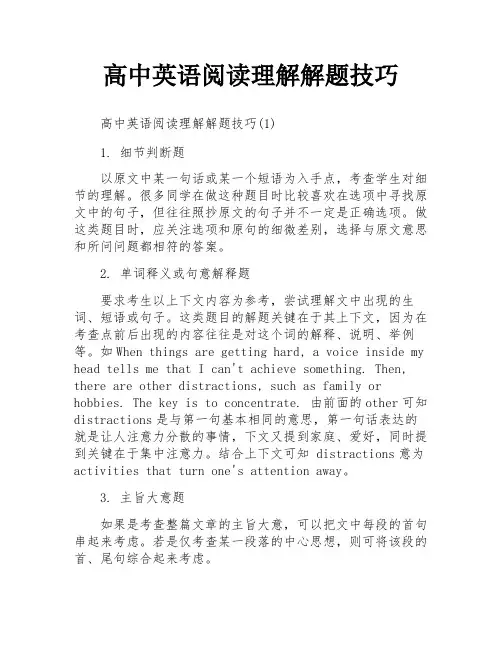
高中英语阅读理解解题技巧高中英语阅读理解解题技巧(1)1. 细节判断题以原文中某一句话或某一个短语为入手点,考查学生对细节的理解。
很多同学在做这种题目时比较喜欢在选项中寻找原文中的句子,但往往照抄原文的句子并不一定是正确选项。
做这类题目时,应关注选项和原句的细微差别,选择与原文意思和所问问题都相符的答案。
2. 单词释义或句意解释题要求考生以上下文内容为参考,尝试理解文中出现的生词、短语或句子。
这类题目的解题关键在于其上下文,因为在考查点前后出现的内容往往是对这个词的解释、说明、举例等。
如When things are getting hard, a voice inside my head tells me that I can't achieve something. Then, there are other distractions, such as family or hobbies. The key is to concentrate. 由前面的other可知distractions是与第一句基本相同的意思,第一句话表达的就是让人注意力分散的事情,下文又提到家庭、爱好,同时提到关键在于集中注意力。
结合上下文可知 distractions意为activities that turn one's attention away。
3. 主旨大意题如果是考查整篇文章的主旨大意,可以把文中每段的首句串起来考虑。
若是仅考查某一段落的中心思想,则可将该段的首、尾句综合起来考虑。
4. 标题选择题标题的选择要遵循“精、准、全”三原则。
“精”是指要用精炼的语言概括出文章的中心;“准”是指标题的选择要注意文章的外延和内涵,不能扩大或缩小文章的内容;“全”是指标题的选择应该排除掉那些片面的选项,而正确地选取能包含文章的主要内容及要表达的观点的选项。
5. 推理判断题题目中常含有infer, conclude, know/learn from the passage,imply等类似的词。
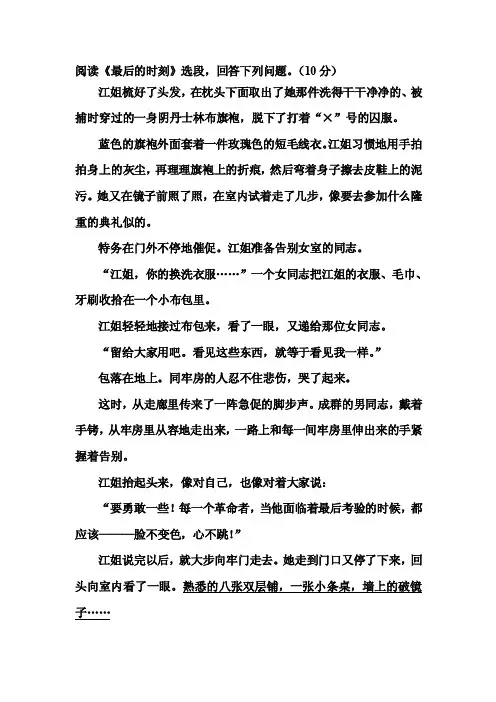
阅读《最后的时刻》选段,回答下列问题。
(10分)江姐梳好了头发,在枕头下面取出了她那件洗得干干净净的、被捕时穿过的一身阴丹士林布旗袍,脱下了打着“×”号的囚服。
蓝色的旗袍外面套着一件玫瑰色的短毛线衣。
江姐习惯地用手拍拍身上的灰尘,再理理旗袍上的折痕,然后弯着身子擦去皮鞋上的泥污。
她又在镜子前照了照,在室内试着走了几步,像要去参加什么隆重的典礼似的。
特务在门外不停地催促。
江姐准备告别女室的同志。
“江姐,你的换洗衣服……”一个女同志把江姐的衣服、毛巾、牙刷收拾在一个小布包里。
江姐轻轻地接过布包来,看了一眼,又递给那位女同志。
“留给大家用吧。
看见这些东西,就等于看见我一样。
”包落在地上。
同牢房的人忍不住悲伤,哭了起来。
这时,从走廊里传来了一阵急促的脚步声。
成群的男同志,戴着手铐,从牢房里从容地走出来,一路上和每一间牢房里伸出来的手紧握着告别。
江姐抬起头来,像对自己,也像对着大家说:“要勇敢一些!每一个革命者,当他面临着最后考验的时候,都应该———脸不变色,心不跳!”江姐说完以后,就大步向牢门走去。
她走到门口又停了下来,回头向室内看了一眼。
熟悉的八张双层铺,一张小条桌,墙上的破镜子……“同志们,永别了!”“江姐!江———”人们红肿着双眼,像猛地醒过来似的,忽地一下扑向签子门。
江姐和许多男同志,挺立在囚车上面,像去迎接庄严的战斗,像去迎接即将到来的黎明。
看,他们的脸上充满了胜利的欢笑,洋溢着圣洁的光辉……读准字音:草拟梳头旗袍囚车污泥典礼洋溢手铐竹签渣滓洞1、本文选自长篇小说《》,本文的主人公是()。
(2分)2、用一句话概括选段的主要内容。
(1分)3、课文《最后的时刻》本意是指(),文中是指()。
(2分)A、江姐牺牲前的短暂时刻B、这一刻在其他时间之后4、文中划横线的句子说明狱中的生活条件(),同时也说明了敌人的()。
(2分)5、“要勇敢一些!每一个革命者,当他面临着最后考验的时候,都应该———脸不变色,心不跳!”(2分)这句话是江姐对()说的,也是对()说的。
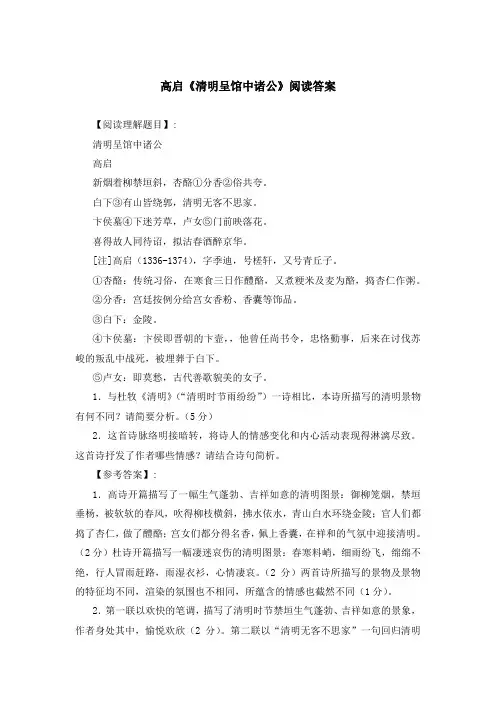
高启《清明呈馆中诸公》阅读答案【阅读理解题目】:清明呈馆中诸公高启新烟着柳禁垣斜,杏酪①分香②俗共夸。
白下③有山皆绕郭,清明无客不思家。
卞侯墓④下迷芳草,卢女⑤门前映落花。
喜得故人同待诏,拟沽春酒醉京华。
[注]高启(1336-1374),字季迪,号槎轩,又号青丘子。
①杏酪:传统习俗,在寒食三日作醴酪,又煮粳米及麦为酪,捣杏仁作粥。
②分香:宫廷按例分给宫女香粉、香囊等饰品。
③白下:金陵。
④卞侯墓:卞侯即晋朝的卞壸,,他曾任尚书令,忠恪勤事,后来在讨伐苏峻的叛乱中战死,被埋葬于白下。
⑤卢女:即莫愁,古代善歌貌美的女子。
1.与杜牧《清明》(“清明时节雨纷纷”)一诗相比,本诗所描写的清明景物有何不同?请简要分析。
(5分)2.这首诗脉络明接暗转,将诗人的情感变化和内心活动表现得淋漓尽致。
这首诗抒发了作者哪些情感?请结合诗句简析。
【参考答案】:1.高诗开篇描写了一幅生气蓬勃、吉祥如意的清明图景:御柳笼烟,禁垣垂杨,被软软的春风,吹得柳枝横斜,拂水依水,青山白水环绕金陵;官人们都捣了杏仁,做了醴酪;宫女们都分得名香,佩上香囊,在祥和的气氛中迎接清明。
(2分)杜诗开篇描写一幅凄迷哀伤的清明图景:春寒料峭,细雨纷飞,绵绵不绝,行人冒雨赶路,雨湿衣衫,心情凄哀。
(2分)两首诗所描写的景物及景物的特征均不同,渲染的氛围也不相同,所蕴含的情感也截然不同(1分)。
2.第一联以欢快的笔调,描写了清明时节禁垣生气蓬勃、吉祥如意的景象,作者身处其中,愉悦欢欣(2分)。
第二联以“清明无客不思家”一句回归清明的主题,不言己情而言众情,含蓄地表达了作者在清明时节的悼亡之情和身在异地的思乡之情(2分)。
第三联运用卞侯和莫愁的典故,即使忠如卞侯,美如莫愁,也只留一堆芳草,供人凭吊,陡然生发“人生如朝露”的慨叹,悲从中来(2分)。
第四联“待诏”“酒醉京华”,将仕途如意的喜悦和渴望成就功名的豪情显露无遗(2分)。
(每点2分,答出其中任意三点给满分)[评析]本诗写帝都清明节光景透露出思乡的一缕深情。
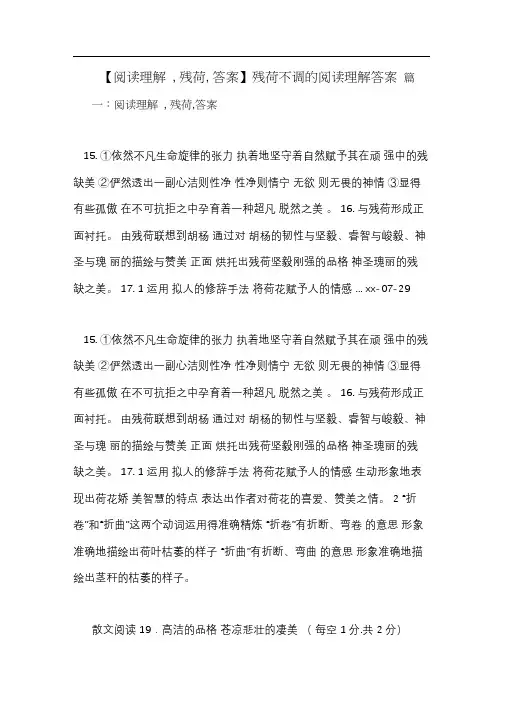
【阅读理解, 残荷, 答案】残荷不调的阅读理解答案篇一:阅读理解, 残荷,答案15. ①依然不凡生命旋律的张力执着地坚守着自然赋予其在顽强中的残缺美②俨然透出一副心洁则性净性净则情宁无欲则无畏的神情③显得有些孤傲在不可抗拒之中孕育着一种超凡脱然之美。
16. 与残荷形成正面衬托。
由残荷联想到胡杨通过对胡杨的韧性与坚毅、睿智与峻毅、神圣与瑰丽的描绘与赞美正面烘托出残荷坚毅刚强的品格神圣瑰丽的残缺之美。
17. 1 运用拟人的修辞手法将荷花赋予人的情感 ... xx-07-2915. ①依然不凡生命旋律的张力执着地坚守着自然赋予其在顽强中的残缺美②俨然透出一副心洁则性净性净则情宁无欲则无畏的神情③显得有些孤傲在不可抗拒之中孕育着一种超凡脱然之美。
16. 与残荷形成正面衬托。
由残荷联想到胡杨通过对胡杨的韧性与坚毅、睿智与峻毅、神圣与瑰丽的描绘与赞美正面烘托出残荷坚毅刚强的品格神圣瑰丽的残缺之美。
17. 1 运用拟人的修辞手法将荷花赋予人的情感生动形象地表现出荷花娇美智慧的特点表达出作者对荷花的喜爱、赞美之情。
2 “折卷”和“折曲”这两个动词运用得准确精炼“折卷”有折断、弯卷的意思形象准确地描绘出荷叶枯萎的样子“折曲”有折断、弯曲的意思形象准确地描绘出茎秆的枯萎的样子。
散文阅读 19.高洁的品格苍凉悲壮的凄美(每空 1分.共 2 分)20.在繁华褪尽的萧索里 , 保持生命与生俱来的不屈和圣洁;在凄风冷雨的逆境中 ,保持灵魂的那份纯真与高贵 .(共2分)21.[a] 处示例:“悲苦”“冷雨”“孤寂”“落寞”四个词语 , 形象地表现了残荷的凄凉 .[b] 处示例:是憔悴的神态 , 也是不屈的神态 . 为下文赞叹残荷铺垫.(批注的角度可以是修辞、词语、句意理解等 ,符合要求即可 . 每句 2 分, 共 4 分)22 .示例:满塘的荷花依旧会在荷叶的拥托之中 , 亭亭玉立 , 香远益清 . 含苞的娇羞欲语 , 怒放的潇洒舒展 . 粉荷美艳 , 白荷净洁,演绎万种风情 .(扣住夏日荷塘描写 1分,内容 2分,修辞1分. 共 4分)篇三:阅读理解 , 残荷,答案残荷听雨③平生是那么地喜欢荷,不仅因为她美丽的外表,更因为她高洁的品格。
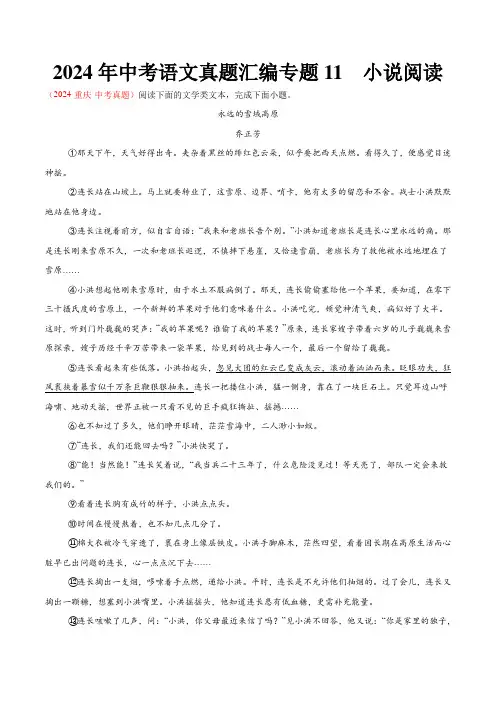
2024年中考语文真题汇编专题11 小说阅读(2024·重庆·中考真题)阅读下面的文学类文本,完成下面小题。
永远的雪域高原乔正芳①那天下午,天气好得出奇。
夹杂着黑丝的绯红色云朵,似乎要把西天点燃。
看得久了,便感觉目迷神摇。
②连长站在山坡上。
马上就要转业了,这雪原、边界、哨卡,他有太多的留恋和不舍。
战士小洪默默地站在他身边。
③连长注视着前方,似自言自语:“我来和老班长告个别。
”小洪知道老班长是连长心里永远的痛。
那是连长刚来雪原不久,一次和老班长巡逻,不慎摔下悬崖,又恰逢雪崩,老班长为了救他被永远地埋在了雪原……④小洪想起他刚来雪原时,由于水土不服病倒了。
那天,连长偷偷塞给他一个苹果,要知道,在零下三十摄氏度的雪原上,一个新鲜的苹果对于他们意味着什么。
小洪吃完,顿觉神清气爽,病似好了大半。
这时,听到门外巍巍的哭声:“我的苹果呢?谁偷了我的苹果?”原来,连长家嫂子带着六岁的儿子巍巍来雪原探亲,嫂子历经千辛万苦带来一袋苹果,给见到的战士每人一个,最后一个留给了巍巍。
⑤连长看起来有些低落。
小洪抬起头,忽见大团的红云已变成灰云,滚动着汹汹而来。
眨眼功夫,狂风裹挟着暴雪似千万条巨鞭狠狠抽来。
连长一把搂住小洪,猛一侧身,靠在了一块巨石上。
只觉耳边山呼海啸、地动天摇,世界正被一只看不见的巨手疯狂撕扯、摇撼……⑥也不知过了多久,他们睁开眼睛,茫茫雪海中,二人渺小如蚁。
⑦“连长,我们还能回去吗?”小洪快哭了。
⑧“能!当然能!”连长笑着说,“我当兵二十三年了,什么危险没见过!等天亮了,部队一定会来救我们的。
”⑨看着连长胸有成竹的样子,小洪点点头。
⑩时间在慢慢熬着,也不知几点几分了。
⑪棉大衣被冷气穿透了,裹在身上像层铁皮。
小洪手脚麻木,茫然四望,看着因长期在高原生活而心脏早已出问题的连长,心一点点沉下去……⑫连长掏出一支烟,哆嗦着手点燃,递给小洪。
平时,连长是不允许他们抽烟的。
过了会儿,连长又掏出一颗糖,想塞到小洪嘴里。
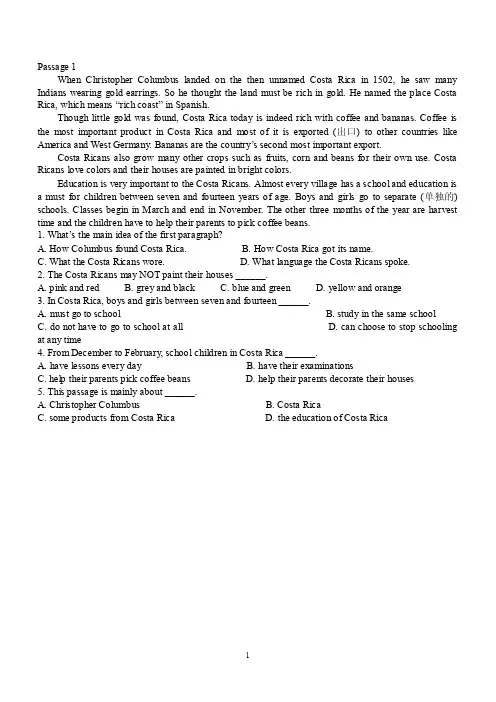
When Christopher Columbus landed on the then unnamed Costa Rica in 1502, he saw many Indians wearing gold earrings. So he thought the land must be rich in gold. He named the place Costa Rica, which means “rich coast” in Spanish.Though little gold was found, Costa Rica today is indeed rich with coffee and bananas. Coffee is the most important product in Costa Rica and most of it is exported (出口) to other countries like America and West Germany. Bananas are the country’s second most important export.Costa Ricans also grow many other crops such as fruits, corn and beans for their own use. Costa Ricans love colors and their houses are painted in bright colors.Education is very important to the Costa Ricans. Almost every village has a school and education is a must for children between seven and fourteen years of age. Boys and girls go to separate (单独的) schools. Classes begin in March and end in November. The other three months of the year are harvest time and the children have to help their parents to pick coffee beans.1. What’s the main idea of the first paragraph?A. How Columbus found Costa Rica.B. How Costa Rica got its name.C. What the Costa Ricans wore.D. What language the Costa Ricans spoke.2. The Costa Ricans may NOT paint their houses ______.A. pink and redB. grey and blackC. blue and greenD. yellow and orange3. In Costa Rica, boys and girls between seven and fourteen ______.A. must go to schoolB. study in the same schoolC. do not have to go to school at allD. can choose to stop schooling at any time4. From December to February, school children in Costa Rica ______.A. have lessons every dayB. have their examinationsC. help their parents pick coffee beansD. help their parents decorate their houses5. This passage is mainly about ______.A. Christopher ColumbusB. Costa RicaC. some products from Costa RicaD. the education of Costa RicaChristian Eijkman, a Dutch doctor, left the Netherlands for the island of Java. Many people on the island had a disease called beri-beri. He was going there to try and find a cure.At first, Eijkman thought some kind of germ (细菌) caused beri-beri. He raised some chickens. He didn’t eat them, but made experiments on them. The local people were quite surprised at that. One day he noticed that his chickens became sick when they were fed the food most Javanese ate —refined white rice (精炼米). When he fed them with unrefined rice, also known as brown rice, they recovered. Eijkman realized that he had made an important discovery —that some things in food could prevent disease. These things were named vitamins (维生素). The Javanese were not getting enough vitamins because they had actually removed the part that contains vitamins. Later, other diseases were also found to be caused by the lack of vitamins in a person’s food.Today many people know the importance of vitamins and they make sure they have enough vitamins from the food they eat. If they don’t, they can also take vitamin pills.6. The underlined word “cure” in Paragragh 1 probably means ______.A. a medical treatmentB. a kind of vitaminC. a kind of germD. a kind of ric7. Christian Eijkman went to the island of Java to ______.A. spend his holidayB. find ways to grow better cropsC. do some research about the islandD. help the Javanese with their illness8. Why did Christian Eijkman raise some chickens?A. To eat them.B. To carry out his experiments.C. To give the Javanese a surprise.D. To make money by selling them.9. If a person doesn’t get enough vitamins in his diet, he’d better ______.A. eat more riceB. eat more meatC. eat some chickenD. eat vitamin pills10. We can learn from the passage that ______.A. beri-beri was caused by chickensB. the Javanese didn’t like vita minsC. Christian Eijkman’s experiment was successfulD. the Javanese’s disease was caused by a kind of germAmerica is a mobile society. Friendships between Americans can be close and real, yet disappear soon if situations change. Neither side feels hurt by this. Both may exchange Christmas greetings for a year or two, perhaps a few letters for a while — then no more. If the same two people meet again by chance, even years later, they pick up the friendship. This can be quite difficult for us Chinese to understand, because friendships between us flower more slowly but then may become lifelong feelings, extending (延伸) sometimes deeply into both families.Americans are ready to receive us foreigners at their homes, share their holidays, and their home life. They will enjoy welcoming us and be pleased if we accept their hospitality (好客) easily. Another difficult point for us Chinese to understand Americans is that although they include us warmly in their personal everyday lives, they don’t show their politeness to us if it requires a great deal of time. This is usually the opposite of the practice in our country where we may be generous with our time. Sometimes, we, as hosts, will appear at airports even in the middle of the night to meet a friend. We may take days off to act as guides to our foreign friends. The Americans, however, express their welcome usually at homes, but truly can not manage the time to do a great deal with a visitor outside their daily routine. They will probably expect us to get ourselves from the airport to our own hotel by bus. And they expect that we will phone them from there. Once we arrive at their homes, the welcome will be full, warm and real. We will find ourselves treated hospitably.For the Americans, it is often considered more friendly to invite a friend to their homes than to go to restaurants, except for purely business matters. So accept their hospitality at home!11. The writer of this passage must be ______.A. an AmericanB. a ChineseC. a professorD. a student12. Which of the following statements is TRUE according to the passage?A. Friendships between Americans usually extend deeply into their families.B. Friendships between Americans usually last for all their lives.C. Americans always show their warmth even if they are very busy.D. Americans will continue their friendships again even after a long break.13. From the last two paragraphs we can learn that when we arrive in America to visit an American friend, we will probably be ______.A. warmly welcomed at the airportB. offered a ride to his homeC. treated hospitably at his homeD. treated to dinner in a restaurant14. The underlined words “generous with our time” in Paragraph 3 probably mean ______.A. strict with timeB. serious with timeC. careful with timeD. willing to spend time15. A suitable title for this passage would probably be “______”.A. Friendships between ChineseB. Friendships between AmericansC. Americans’ hospitalityD. Americans’ and Chinese’s views of friendshipsThe other day I heard a few local musicians talking:“I hate all the terrible pianos in this town. I hate that rubbish they play on the radio. They can’t even understand a bit of music.”“I’m never playing in that club again. Too many drunks and nobody listens to us.”But, one younger musician said, “There are a few clubs that book my band a few nights a month, and I’m trying to find other places to play. I’m also looking to book a few summer festivals this year.”I’ve heard that you are the average of the five people whom you spend the most time with, or to put it another way, you are who your friends are.Attitu des are important. Whether they’ positive or negative, they’ rubbing off on you. If you’ around re re re people who complain about lack of work and about other musicians, or blame (责怪) others, and you play the role of victim (受害者), chances are you will start to as well. So it’s time to take a look at the people you call “friends”.This is an easy exercise: Make a list of the people who you hang out with, and simply stop spending time with the negative people on your list. Set a new standard (标准) for yourself and don’t become friends with people who fall below that standard.Keep successful people around you and your own chances for success will be much better. Ask them how they do it. Ask if they will help you get the work you’re looking for, or maybe give you some advice to help you on your career path.16. Which of the following would be the best title for this passage?A. A friend in need is a friend indeedB. How to make friendship last for everC. Y ou are who your friends areD. Friends are the most important in one’s success17. The underlined sentence “they’re rubbing off on you” in Parag raph 6 means ______.A. they’ll push you aheadB. they’ll influence youC. they’ll cover your shortcomingsD. they’ll help you achieve your goal18. The musicians’ words at the beginning are writ ten mainly to show ______.A. the musicians’ living conditions are quite poorB. people have poor taste in musicC. people have different attitudes towards the same thingD. young people have greater chances of succeeding19. By taking the exercise mentioned in Paragraph 7, you can ______.A. improve a lot in making more friendsB. come to the right way of making friendsC. develop a better relationship with your friendsD. arrange the time with your friends properly20. The passage is mainly written for ______.A. musiciansB. managersC. negative peopl eD. people wanting to succeedNorm Pethrick, a 36-year-old man in Australia’s northern city Darwin, was praised on Thursd ay for jumping onto a crocodile’s back to save his wife Wendy at Litchfield National Park, a popular tourist spot southwest of Darwin, a local newspaper reported.Ms Pethrick was standing on a river bank Wednesday afternoon when the saltwater crocodile lunged (扑), locking its jaws on both her legs as it tried to drag her underwater.Norm Pethrick, who with his wife had been collecting water, immediately went to help her. He jumped onto the back, poked (戳) the eyes of the crocodile and finally got his wife free.Ms Pethrick was later taken to Royal Darwin Hospital for a medical treatment. The doctors said she was suffering eight puncture wounds (伤口) in her right leg, a puncture wound in her left leg and a serious cut to one 3 of her fingers.“This coul d have been a fatal and tragic situation,” said the general manager of Royal Darwin Hospital (RDH), Dr Len Notaras, according to a local report.He said Ms Pethrick was saved by her husband’s “quick and diligent actions”.Dr Notaras also said she would remain in hospital for three to four days and have an operation to clean the wounds, which are easy to get infected because of bacteria (细菌) on the teeth of the crocodile.21. This passage is most likely to be found in _____.A. a travel guideB. a newspaperC. a textbookD. a novel22. The crocodile attacked Ms Pethrick when she was ______.A. swimming in the riverB. standing on the river bankC. watching the crocodileD. fishing in the water23. Which of the following statements is TRUE about Ms Pethrick?A. Her eyes were badly poked.B. She had eight wounds altogether.C. One of her fingers also got hurt.D. One of the crocodile’s teeth was found in her leg.24. According to the passage, Norm Pethrick can be described as following EXCEPT ______.A. braveB. diligentC. quickD. humorous25. Which of the following would be the best title for this passage?A. The husband should save the wifeB. A man saves wife’s life from crocodile’s jawsC. A crocodile is not so dangerous as people imagineD. Human beings can beat crocodiles sometimesThere are many ways to find a job. It can be as easy as walking into a neighborhood store to look at its announcement board. Local stores often have areas where people can put small signs telling what kind of service they need or can provide. Such services include caring for children or cleaning houses.Or, job searchers can look in the newspaper. Local newspapers have employment announcements placed by companies seeking workers.Another popular tool for finding jobs is the Internet. For example, people in four hundred and fifty cities around the world can use the Craigslist Web site to buy objects, meet people or find a job. Craigslist says that it receives two million new job listings each month.Another useful way to find a job is through a college or university. For example, students at the University of Texas in Austin can go to the Career Exploration Center to get help in finding a job. Of course, looking for a job requires knowing what kind of work you want to do. For example, there is a book called “What Color is Y our Parachute (降落伞)?” by Richard Bolles. This book has been helping people choose a career (职业) since it was first published in nineteen seventy.Some experts also help people find jobs. Susan W. Miller owns a company called California Career Services in Los Angeles. She says her company helps people find jobs by first helping them understand their strengths, goals and interests. Then she provides them with methods and resources to help them find the right job.26. What is the passage mainly about?A. Finding a job.B. College students’ part-time jobs.C. Craigslist Web site.D. The relation between study and work.27. By logging on the Craigslist Web site, you can ______.A. sell your old thingsB. do some shopping onlineC. create your own announcement boardD. get useful information about 450 cities28. “What Color is Y our Parachute?” is a book which gives tips to those who want to _____.A. work on the airplaneB. buy a parachuteC. publish a bookD. find a suitable job29. It can be learned from the passage that ______.A. companies often put job information in local shopsB. the Internet is the most popular tool for job hunters in the USAC. Susan W. Miller’s company is helping people choose careersD. California Career Services mainly serves university students30. How many ways of finding a job are mentioned in the passage?A. Three.B. Four.C. Five.D. Six.Teaching materials for learning Chinese are provided here. There are sites where you may find interesting instructions suitable for you. Here are some sites to begin your surfing.Y ou may start with these pages from this website — just to get a little taste of it without working too hard.● A Is For LoveFlash cards for learning a few Chinese words● Listening to the sound of ChinesePlay a few words of Chinese on your computer.● A few Chinese wordsEach word is enlarged for easy study.If you are studying Chinese, these tools can help.● Zhongwen siteMore than a dictionary!● Clavis SinicaExcellent program by Professor David Porter. It displays a whole document in Chinese [GB] or [BIG5], and gives individual word’s definition, pronunciation as well as much more information when you click on that word. If you are studying Chinese, this is a very useful tool.● Chinese Character V isual DictionaryIf you like to know more, go to the following sites on the Internet.● The Chinese OutpostPronunciation, Character and Grammer By Mark Andrew Baker. The best. A must-visit site.● Learn Cantonese / Mandarin Online● Internet Based Chinese Teaching and Learning● Rainl and Kids discover Chinese — Site is in GermanyIf you want to have a better understanding of China, go to this one.● Wanfang DataAs an affiliate (分支) of Chinese Ministry of Science && Technology, Wanfang Data has been the leading information provider in China since 1950s. With a wide range of database resources and value-added services, Wanfang Data has become a gateway to understanding Chinese culture, medicine, business, science, etc.31. The underlined lines are probably some ______.A. booksB. websitesC. tips for learning ChineseD. dictionaries for learning Chinese32. This passage is most probably from ______.A. a TV programmeB. a teacher’s lectureC. a newspaperD. the Internet33. If you want to kno w each Chinese character’s definition, pronunciation and much more information, you’d better surf ______.A. Zhongwen siteB. A Is For LoveC. Clavis SinicaD. A few Chinese words34. If you want to know China about its culture, m edicine, business, science, you’d better surf ______.A. Learn Mandarin onlineB. Wanfang DataC. Rainland kids discover ChineseD. The Chinese Outpost35. The underlined word “gateway” in the last paragraph probably refers to ______.A. an opening in a wall that can be closed by a gateB. a place through which you can go to another placeC. the space when a door is openD. a means of getting or achieving somethingEnglish is the most widely used language in the history of our planet. One in every seven human beings can speak it. More than half of the world’s books and three quarters of international mail are in English. Of all languages, English has the largest vocabulary — perhaps as many as two million words.However, let’s face it: English is a crazy language. There is no egg in an eggplant, neither pine nor apple in a pineapple and no ham in a hamburger. Sweet-meats are candy, while sweetbreads, which aren’t sweet, are meat.We take English for granted. But when we explore its paradoxes (探讨它的矛盾), we find that quicksand can work slowly, boxing rings are square, public bathrooms have no baths in them.And why is it that a writer writes, but fingers don’t fing, grocers don’t groce, and hammers don’t ham? If the plural of tooth is teeth, shouldn’t the plural of booth be beeth? One goose, two g eese — so one moose, two meese?How can a slim chance and a fat chance be the same, while a wise man and a wise guy are opposites? How can overlook and oversee be opposites, while quite a lot and quite a few are alike? How can the weather be hot as hell one day and cold as hell the next?English was invented by people, not computers, and it reflects (反映) the creativity of human beings. That’s why, when stars are out, they are visible (能看见的); but when the lights are out, they are invisible. And why, when I wind up my watch, I start it; but when I wind up this essay, I end it.36. According to the passage ______.A. sweet-meats and sweetbreads are different thingsB. there should be egg in an eggplantC. pineapples are the apples on the pine treeD. boxing rings should be round37. Which of the following is the correct plural?A. Beeth.B. Geese.C. Meese.D. Tooth.38. Which of the following includes two items which have the similar meaning?A. A wise man and a wise guy.B. Overlook and oversee.C. Quite a lot and quite a few.D. Hot as hell and cold as hell.39. The underlined words “wind up” in the last paragraph probably mean “______”.A. blowB. roll upC. get hurtD. finish40. Through the many paradoxes in the English language, the writer wants to show that human beings are ______.A. cleverB. crazyC. lazyD. dullA friend of mine named Paul received an expensive car from his brother as a Christmas present.On Christmas Eve when Paul came out of his office,street urchin was walking around the shining car.this your a “Is car,Paul?”he asked.Paul answered,“Y es,my brother gave it to me for Christmas.” The boy was surprised.“Y ou mean your brother gave it to you and it didn't cost you nothing?Boy,I wish…” He hesitated.Of course Paul knew what he was going to wish for.was going to wish he had a brother like that. But what the He boy said surprised Paul greatly.“I wish,” the boy went on,“that I could be a brother like that.” Paul looked at the boy in surprise, then he said again, “Would you like to take a ride in my car?”“Oh yes,I'd love that.”After a short ride,boy turned and with his eyes shining,the said,“Paul,would you mind driving in front of my house?”Paul smiled a little.He thought he knew what the boy wanted.He wanted to show his neighbours that he could ride home in a big car. But Paul wa s wrong again. “Will you stop where those two steps are?” the boy asked.He ran up to the steps. Then in a short while Paul heard him coming back, but he was not coming fast. He was carrying his little crippled brother. He sat him down on the step and pointed to the car.“There she is, Buddy, just like I told you upstairs. His brother gave it to him for Christmas and it didn't cost him a cent. And some day I'm going to give you one just like it…then you can see for yourself all the nice things in the Chri stmas windows that I've been trying to tell you about.”Paul got out and lifted the boy to the front seat of his car. The shining-eyed older brother climbed in beside him and the three of them began an unforgettable holiday ride.注:urchin 顽童hesitate 犹豫neighbour 邻居crippled 残疾cent 美分41.The street urchin was very surprised when ________.A.Paul received an expensive car B.Paul told him about the car C.he saw the shining car D.he was walking around the car 42.From the story we can see the urchin ________.A.wished to give his brother a car B.wanted Paul’s brother to give him a carC.wished he could have a brother like Paul's D.wished Paul could be a brother like that43.The urchin asked Paul to stop his car in front of his house ________.A.to show his neighbours the big car B.to show he had a rich friend C.to let his brother ride in the car D.to tell his brother about his wish 44.We can infer(推断)from the story that ________.A.Paul couldn't understand the urchin B.the urchin had a deep love for his brother C.the urchin wished to have a rich brother D.the urchin's wish came true in the end 45.The best name of the name story is _________.A.A Christmas Present B.A Street Urchin C.A Brother Like That D.An Unforgettable Holiday RideCool”is a word with many meanings.Its old meaning is used to express a temperature that is a little bit cold.As the world has changed,the word has had many different meaning.“Cool”can be used to express feelings of interest in almost anything.When you see a famous car in the street,maybe you will say,“It's cool.”Y ou may think,“He's so cool,”when you see your favourite footballer.We all maximize (扩大)the meaning of “cool” Y ou can use it instead of many words such as “new” or .“surprising” .Here's an interesting story we can use to show the way the word is used.A teacher asked her students to write about the waterfall(瀑布)they had visited.On one student's paper was Just the one sentence,“It's so cool.Maybe he thought it was the best way to show what he saw and felt.But the story also shows a scarcity (缺乏)of words.Without “cool” ,some people have no words to show the same meaning.So it is quite important to keep some credibility (可信性)Can you think of many other words .that make your life as colourful as the word “cool”?I can.And I think they are also very cool.46.We know that the word "cool" has had ________.A.only one meaning B.no meanings C.many different meanings D.the same meaning47.In the passage,the word“express”means“________”.A.see B.show C.know D.feel48.If you are _______ something,you may say,“It’s cool.”A.interested in B.angry about C.afraid of D.unhappy with49.The writer takes an example to show he is ________ the way the word is used.A.pleased with B.strange to C.worried about D.careful with50.In the passage,the writer suggests(暗示)that the word “cool”________.A.can be used instead of many words B.usually means something interesting C.can make your life colourful D.may not be as cool as it seems01-05 BBACB06-10 ADBDC11-15 BDCDD16-20 CBCBD21-25 BBCDB26-30 ABDCC31-35 BDCBD36-40 ABCDA41-15 BADBC。
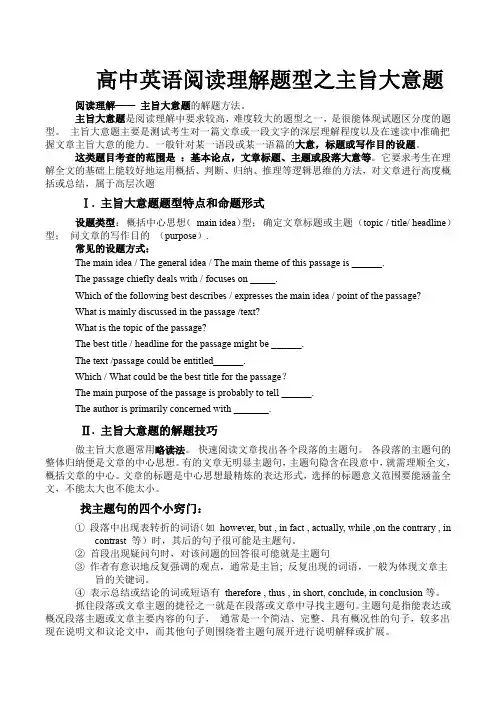
高中英语阅读理解题型之主旨大意题阅读理解——主旨大意题的解题方法。
主旨大意题是阅读理解中要求较高,难度较大的题型之一,是很能体现试题区分度的题型。
主旨大意题主要是测试考生对一篇文章或一段文字的深层理解程度以及在速读中准确把握文章主旨大意的能力。
一般针对某一语段或某一语篇的大意,标题或写作目的设题。
这类题目考查的范围是:基本论点,文章标题、主题或段落大意等。
它要求考生在理解全文的基础上能较好地运用概括、判断、归纳、推理等逻辑思维的方法,对文章进行高度概括或总结,属于高层次题Ⅰ. 主旨大意题题型特点和命题形式设题类型:概括中心思想(main idea)型;确定文章标题或主题(topic / title/ headline)型;问文章的写作目的(purpose).常见的设题方式:The main idea / The general idea / The main theme of this passage is ______.The passage chiefly deals with / focuses on _____.Which of the following best describes / expresses the main idea / point of the passage?What is mainly discussed in the passage /text?What is the topic of the passage?The best title / headline for the passage might be ______.The text /passage could be entitled______.Which / What could be the best title for the passage?The main purpose of the passage is probably to tell ______.The author is primarily concerned with _______.Ⅱ. 主旨大意题的解题技巧做主旨大意题常用略读法。
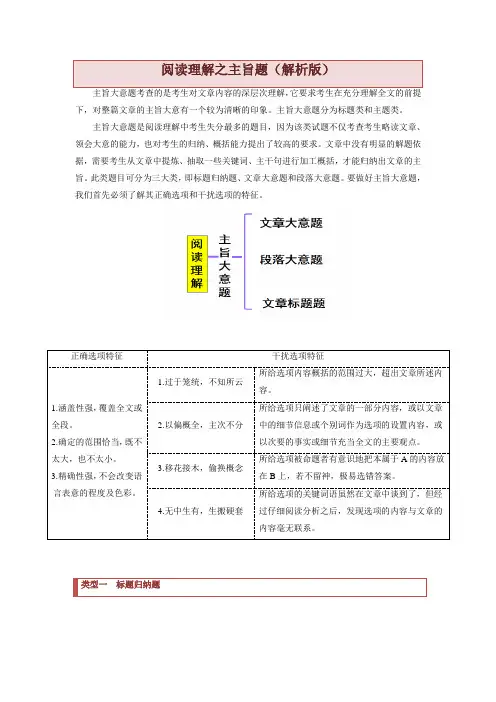
阅读理解之主旨题(解析版)主旨大意题考查的是考生对文章内容的深层次理解,它要求考生在充分理解全文的前提下,对整篇文章的主旨大意有一个较为清晰的印象。
主旨大意题分为标题类和主题类。
主旨大意题是阅读理解中考生失分最多的题目,因为该类试题不仅考查考生略读文章、领会大意的能力,也对考生的归纳、概括能力提出了较高的要求。
文章中没有明显的解题依据,需要考生从文章中提炼、抽取一些关键词、主干句进行加工概括,才能归纳出文章的主旨。
此类题目可分为三大类,即标题归纳题、文章大意题和段落大意题。
要做好主旨大意题,我们首先必须了解其正确选项和干扰选项的特征。
正确选项特征干扰选项特征1.涵盖性强,覆盖全文或全段。
2.确定的范围恰当,既不太大,也不太小。
3.精确性强,不会改变语言表意的程度及色彩。
1.过于笼统,不知所云所给选项内容概括的范围过大,超出文章所述内容。
2.以偏概全,主次不分所给选项只阐述了文章的一部分内容,或以文章中的细节信息或个别词作为选项的设置内容,或以次要的事实或细节充当全文的主要观点。
3.移花接木,偷换概念所给选项被命题者有意识地把本属于A的内容放在B上,若不留神,极易选错答案。
4.无中生有,生搬硬套所给选项的关键词语虽然在文章中谈到了,但经过仔细阅读分析之后,发现选项的内容与文章的内容毫无联系。
类型一标题归纳题一、提问方式·The best title of the passage is ________.·Which of the following is the best title of the passage?·What would be the best title for the passage?·The most appropriate title of the passage is ______.二、解题必备知能(一)理解标题的3大特点一个好的标题应具备三大特点:1.概括性——准确而又简短;2.针对性——标题外延正好与文章内容相符;3.醒目性——能引发读者的阅读欲望。
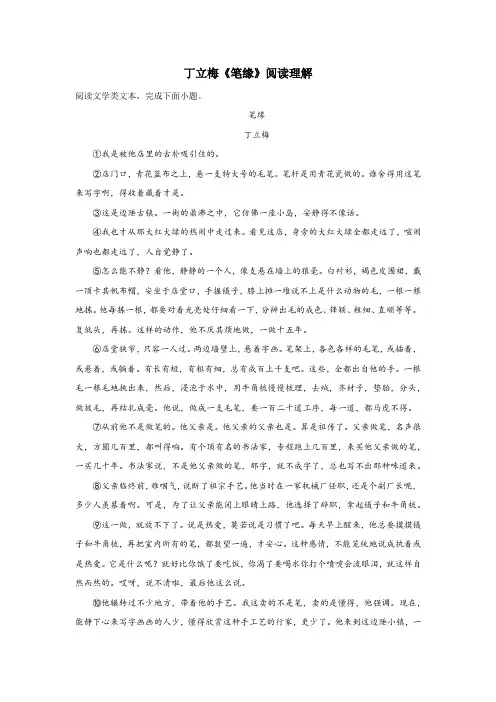
丁立梅《笔缘》阅读理解阅读文学类文本,完成下面小题。
笔缘丁立梅①我是被他店里的古朴吸引住的。
②店门口,青花蓝布之上,悬一支特大号的毛笔。
笔杆是用青花瓷做的。
谁舍得用这笔来写字啊,得收着藏着才是。
③这是边陲古镇。
一街的鼎沸之中,它仿佛一座小岛,安静得不像话。
④我也才从那大红大绿的热闹中走过来。
看见这店,身旁的大红大绿全都走远了,喧闹声响也都走远了,人自觉静了。
⑤怎么能不静?看他,静静的一个人,像支悬在墙上的狼毫。
白衬衫,褐色皮围裙,戴一顶卡其帆布帽,安坐于店堂口,手握镊子,膝上摊一堆说不上是什么动物的毛,一根一根地拣。
他每拣一根,都要对着光亮处仔细看一下,分辨出毛的成色、锋颖、粗细、直顺等等。
复低头,再拣。
这样的动作,他不厌其烦地做,一做十五年。
⑥店堂狭窄,只容一人过。
两边墙壁上,悬着字画。
笔架上,各色各样的毛笔,或插着,或悬着,或躺着。
有长有短,有粗有细,总有成百上千支吧。
这些,全都出自他的手。
一根毛一根毛地挑出来,然后,浸泡于水中,用牛角梳慢慢梳理,去绒,齐材子,垫胎,分头,做披毛,再结扎成毫。
他说,做成一支毛笔,要一百二十道工序,每一道,都马虎不得。
⑦从前他不是做笔的。
他父亲是。
他父亲的父亲也是。
算是祖传了。
父亲做笔,名声很大,方圆几百里,都叫得响。
有个顶有名的书法家,专程跑上几百里,来买他父亲做的笔,一买几十年。
书法家说,不是他父亲做的笔,那字,就不成字了,总也写不出那种味道来。
⑧父亲临终前,难咽气,说断了祖宗手艺。
他当时在一家机械厂任职,还是个副厂长呢,多少人羡慕着啊。
可是,为了让父亲能闭上眼睛上路,他选择了辞职,拿起镊子和牛角梳。
⑨这一做,就放不下了。
说是热爱,莫若说是习惯了吧。
每天早上醒来,他总要摸摸镊子和牛角梳,再把室内所有的笔,都数望一遍,才安心。
这种感情,不能笼统地说成执着或是热爱。
它是什么呢?就好比你饿了要吃饭,你渴了要喝水你打个喷嚏会流眼泪,就这样自然而然的。
哎呀,说不清啦,最后他这么说。
矛盾《风景谈(节选)》阅读理解阅读下面的材料,完成下列小题。
文本一:风景谈(节选)茅盾前夜看了《塞上风云》的预告片,便又回忆起猩猩峡外的沙漠来了。
没有隆起的沙丘,也不见有半间泥房,四顾只是茫茫一片,那样的平坦,连一个“坎儿井”也找不到,那样的纯然一色,又是那样的寂静,似乎只有热空气在作哄哄的火响。
然而,你不能说,这里就没有“风景”。
当地平线上出现了第一个黑点,当更多的黑点成为线,成为队,而且当微风把铃铛的柔声,丁当,丁当,送到你的耳鼓,而最后,当那些昂然高步的骆驼,排成整齐的方阵,安详然而坚定地愈行愈近,当骆驼队中领队驼所掌的那一杆长方形猩红大旗耀入你眼帘,而且大小丁当的谐和的合奏充满了你耳管,多么庄严,多么妩媚呀!这里是大自然的最单调最平板的一面,然而加上了人的活动,就完全改观,难道这不是“风景”吗?自然是伟大的,然而人类更伟大。
于是我又回忆起另一个画面,这就在所谓“黄土高原”!那边的山多数是秃顶的,然而层层的梯田里,那些高秆植物颀长而整齐,等待检阅的队伍似的,在晚风中摇曳,别有一种惹人怜爱的姿态。
可是更妙的是三五月明之夜,天是那样的蓝,月亮离山顶,似乎不过几尺,这时候忽然从山脊上长出两支牛角来,随即牛的全身也出现,掮着犁的人形也出现,并不多,只有三两个,也许还跟着个小孩,他们姗姗而下,在蓝的天,黑的山,银色的月光的背景上,成就了一幅剪影,如果给田园诗人见了,必将赞叹为绝妙的题材。
可是没有完。
这几位晚归的种地人,还把他们那粗朴的短歌,用愉快的旋律,从山顶上飘下来,直到他们没入了山坳,歌声还是缭绕不散。
另一个时间。
另一个场面。
夕阳在山,干坼的黄土正吐出它在一天内所吸收的热,河水汤汤急流,似乎能把浅浅河床中的鹅卵石都冲走了似的。
这时候,沿河的山坳里有一队人,从“生产”归来,兴奋的谈话中,至少有七八种不同的方音。
忽然间,他们又用同一的音调,唱起雄壮的歌曲来了,他们的爽朗的笑声,落到水上,使得河水也似在笑。
高考英语阅读理解技巧点拨—推理判断题(一)题型复习阅读理解归纳为以下四大题型,根据阅读理解题考查角度的不同,可采用不同的解题技巧来应付。
Ⅰ.事实细节题Ⅱ.猜测词义题学会"顺藤摸瓜",通过构词,语法,定义,同位,对比,因果,常识,上下文等线索确定词义。
在阅读解题时要注意从以下七个方面着手:1)根据定义或解释、说明猜测生词的词义2)根据对比关系猜测生词的词义3)通过因果关系猜测词义4)根据生活常识猜测词义5)根据同等关系猜测词义6)根据列举的事例猜测词义7)根据构词法知识猜测词义Ⅲ.推理判断题做这类题要求考生在阅读理解整体语篇的同时,又要求学生对作者的态度、意图及文章细节的发展作正确的推理判断,力求从作者的角度去考虑,不要固守自己的看法或观点。
不要主观臆断,凭空想象,任意发挥,而走入误区。
学生要学会运用主题句去推测、揣摩文字背后作者的意图,运用归纳、对比、演绎技能,运用背景知识去挖掘文章深层含义,从而正确理解作者的言外之意,同时认真体会文章的语气与感情基调(如:否定、厌恶、反问、讽刺等)。
这类试题常以如下句式发问:①What can you conclude/ imply from this passage?②What’s the author’s attitude(态度)towards...?③We can infer /learn from the passage that...Ⅳ.主旨大意题这种题型要求考生能够把握文章的总体,并真正理解主题和中心;要求能较好地运用概括、判断、归纳、推理等逻辑思维方法解题,难度较大,属于高层次题。
一般主旨大意题可以分为两类:1.确定文章的标题和主题(title or topic)标题位于文章之首,用来高度概括文章内容,点明文章主题。
它可以是单词,短语,也可以是句子。
要确定文章标题,首先,要在阅读原文的基础上,考虑标题是否与主题密切相关;其次,看标题是否能概括全文内容。
稀土阅读理解附答案(实用版)编制人:__________________审核人:__________________审批人:__________________编制单位:__________________编制时间:____年____月____日序言下载提示:该文档是本店铺精心编制而成的,希望大家下载后,能够帮助大家解决实际问题。
文档下载后可定制修改,请根据实际需要进行调整和使用,谢谢!并且,本店铺为大家提供各种类型的实用范文,如工作计划、工作总结、演讲稿、合同范本、心得体会、条据文书、应急预案、教学资料、作文大全、其他范文等等,想了解不同范文格式和写法,敬请关注!Download tips: This document is carefully compiled by this editor. I hope that after you download it, it can help you solve practical problems. The document can be customized and modified after downloading, please adjust and use it according to actual needs, thank you!Moreover, our store provides various types of practical sample essays for everyone, such as work plans, work summaries, speech drafts, contract templates, personal experiences, policy documents, emergency plans, teaching materials, complete essays, and other sample essays. If you want to learn about different formats and writing methods of sample essays, please stay tuned!稀土阅读理解附答案稀土阅读理解附答案(精选2篇)稀土阅读理解附答案篇1那么关于稀土阅读附答案是怎样呢?下面是本店铺整理的稀土阅读理解附答案,欢迎阅读。
Passage 48 As price and building costs keep rising, the “do-it-yourself” (DIY) trend in the U.S. continue to grow. “We needed furniture for our living room,” says John Ross, “and we just didn’t have enough money to buy it. So we decided to try making a few tables and chairs.” John got married six months ago, and like many young people these days, they are struggling to make a home at a time when the cost of living is very high. The Rosses took a 2-week course for $280 at a night school. Now they build all their furniture and make repairs around the house. Jim Hatfield has three boys and his wife died. He has a full-time job at home as well as in a shoe-making factory. Last month, he received a car repair bill for $420. “I was deeply upset about it. Now I’ve finished a car repair course, I should be able to fix the car by myself.” John and Jim are not unusual people. Most families in the country are doing everything they can to save money so they can fight the high cost of living, if you want to become a “do-it-yourself”, you can go to DIY classes. And for those who don’t have time to take a course, there are books that tell you how you can do things yourself. 1. We can learn from the passage that many newly married couple __________. A. find it hard to pay for what they need B. have to learn to make their own furniture C. take DIY courses run by the government D. seldom go to a department store to buy things 2. John and his wife went to evening classes to learn how to _________. A. run a DIY shop B. do it themselves in their spare time C. do his own car and home repairs D. keep house and looks after his children 3. When the writer says that Jim has a full-time job at home, he means Jim _________. A. makes shoes in his home B. does extra work at night C. does his own car and home repairs D. keeps house and looks after his children 4. Jim Hatfield decided to become a “do-it-yourself” when _________. A. his car repairs cost too much B. the car repair class was not helpful C. he could not possibly do two jobs D. he had to raise the children all by himself 5. What would be the best title for the passage? A. The Joy of DIY B. You Can Do It Too C. Welcome to Our DIY Course D. Ross and Hatfield: Believers in DIY
Passage 49 In Sydney there is a special long-distance running race called the City to Surf. The race takes place on the second Sunday in August every year. More than 23,000 people run in the race. The race is 14 kilometers long. It starts in the center of the city and finishes at a surf beach called Bondi. That is why it’s called the City to Surf. All kinds of people run in the City to Surf. Some people take their small children in strollers. Other people take their dogs on the lead. Blind people in wheelchairs also take part in the race. Old people take part in the race too. In 1981 the oldest runner was an 81-year-old man and his sister Linda, 76 was the last runner to finish. At the end of the race an official writes down the runner’s names and running times. The newspaper prints the names and running times of the competitors a few days later. In 1981 the first runner took just 40 minutes to run the race. The last runner took two and a half hours. The first man and the first woman to cross the finishing line each received a trophy and a free trip to San Francisco in the United States. There they ran in another long-distance race. 1. What’s “The City to Surf”? A. A popular sort across Australia. B. An international Marathon race held in Sydney. C. An annual long-distance running race in Sydney. D. A professional world heel-and-toe walking race. 2. Where is the race? A. It starts in center Sydney and finishes at Bondi. B. In the center of Sydney. C. In the suburbs of Sydney. D. At the Surf beach of Bondi. 3. When is the race held according to passage? A. In spring. B. In summer. C. In autumn. D. In winter. 4. Who take part in the race? A. Mostly aged and disable people. B. Local citizens and foreign visitors. C. Both professional athletes and ordinary citizens. D. All kinds of people, including the old and the disable. 5. What CAN’T be inferred from the passage? A. “The City to Surf” is a popular event among the people of the city. B. Participation is the essential purpose of the race. C. Old-aged runners are especially encouraged to join the race. D. Disabled people share the same excitement with healthy people in the race.